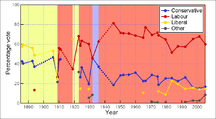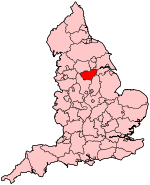Sheffield South East (UK Parliament constituency)
Coordinates: 53°21′43″N 1°25′44″W / 53.362°N 1.429°W
| Sheffield South East | |
|---|---|
|
Borough constituency for the House of Commons | |
|
Boundary of Sheffield South East in South Yorkshire for the 2010 general election. | |
|
Location of South Yorkshire within England. | |
| County | South Yorkshire |
| Electorate | 67,792 (December 2010) |
| Current constituency | |
| Created | 2010 |
| Member of parliament | Clive Betts (Labour) |
| Created from | Sheffield Attercliffe |
| Overlaps | |
| European Parliament constituency | Yorkshire and the Humber |
Sheffield South East is a constituency[n 1] represented in the House of Commons of the UK Parliament since its 2010 creation by Clive Betts, a member of the Labour Party.[n 2]
History
This seat succeeded Sheffield Attercliffe (represented by the Labour MP Clive Betts since 1992) following a minor change[n 3] recommended by the Boundary Commission for England for the 2010 general election and accepted by Parliament.
History of predecessor
The predecessor, Sheffield Attercliffe, was a Labour seat from 1935 since which date candidates of the party had received substantial majorities.
Boundaries
The City of Sheffield wards of Beighton, Birley, Darnall, Mosborough, and Woodhouse.
Constituency profile
As mentioned above, Labour majorities since 1935 have been substantial, meaning the area is potentially one of that party's safe seats. In 2010 the closest runner-up was from the Liberal Democrat candidate.
In statistics
The constituency consists of Census Output Areas of local government districts with a working population whose income is close to or slightly below the national average and close to average reliance upon social housing.[1] At the end of 2012 the unemployment rate in the constituency stood as 4.4% of the population claiming jobseekers' allowance, see table.[2]
| Sheffield's Seats Compared - worklessness[2] | |
|---|---|
| Office for National Statistics November 2012 | Jobseekers Claimant Count |
| Sheffield, Brightside and Hillsborough | 7.6%[n 4] |
| Sheffield Central | 4.0% |
| Sheffield Hallam | 1.5% |
| Sheffield Heeley | 5.7% |
| Sheffield South East | 4.4% |
The district contributing to the seat has a medium 33% of its population without a car.[n 5] A medium 24.3% of the City's population are without qualifications, a high 15.8% of the population with level 3 qualifications and a medium 25.7% with level 4 qualifications or above. In terms of tenure a relatively low 58.3% of homes are owned outright or on a mortgage by occupants as at the 2011 census across the district.[3]
Members of Parliament
| Election | Member[4] | Party | |
|---|---|---|---|
| 2010 | Clive Betts | Labour | |
Elections

Elections in the 2010s
| Party | Candidate | Votes | % | ± | |
|---|---|---|---|---|---|
| Labour | Clive Betts | 21,439 | 51.4 | +2.7 | |
| UKIP | Steven Winstone | 9,128 | 21.9 | +17.3 | |
| Conservative | Matt Sleat | 7,242 | 17.4 | 0.0 | |
| Liberal Democrat | Gail Smith | 2,226 | 5.3 | -18.0 | |
| Green | Linda Duckenfield | 1,117 | 2.7 | +2.7 | |
| CISTA | Jen Battersby | 207 | 0.5 | +0.5 | |
| TUSC | Ian Whitehouse | 185 | 0.4 | +0.4 | |
| English Democrat | Matthew Roberts | 141 | 0.3 | +0.3 | |
| Majority | 12,311 | 29.5 | +4.1 | ||
| Turnout | 41,685 | 59.2 | -2.3 | ||
| Labour hold | Swing | -7.3 | |||
| Party | Candidate | Votes | % | ± | |
|---|---|---|---|---|---|
| Labour | Clive Betts | 20,169 | 48.7 | -11.6 | |
| Liberal Democrat | Gail Smith | 9,664 | 23.3 | +6.4 | |
| Conservative | Nigel Bonson | 7,202 | 17.4 | +3.0 | |
| BNP | Chris Hartigan | 2,345 | 5.7 | +1.6 | |
| UKIP | Jonathan Arnott | 1,889 | 4.6 | +0.2 | |
| Communist | Steve Andrew[9] | 139 | 0.3 | +0.3 | |
| Majority | 10,505 | 25.4 | -17.73 | ||
| Turnout | 41,408 | 61.5 | +6.8 | ||
| Labour hold | Swing | -9.0 | |||
See also
- List of Parliamentary constituencies in South Yorkshire
- List of United Kingdom Parliament constituencies
- The predecessor seat: Sheffield Attercliffe
Notes and references
- Notes
- ↑ A borough constituency (for the purposes of election expenses and type of returning officer)
- ↑ As with all constituencies, the constituency elects one Member of Parliament (MP) by the first past the post system of election at least every five years.
- ↑ The only change being the loss in 2010 of the shared part of the Richmond, South Yorkshire ward to the Sheffield Heeley constintuency.
- ↑ Brightside and Hillsborough also saw the widest gender disparity with 10.5% of men were claimants, vs. 4.8% of women
- ↑ This falls within the centrally coloured banding for metropolitan areas
- References
- ↑ 2001 Census
- 1 2 Unemployment claimants by constituency The Guardian
- ↑ 2011 census interactive maps
- ↑ Leigh Rayment's Historical List of MPs – Constituencies beginning with "S" (part 3)
- ↑ "Election Data 2015". Electoral Calculus. Archived from the original on 17 October 2015. Retrieved 17 October 2015.
- ↑ "Sheffield South East". BBC News. Retrieved 14 May 2015.
- ↑ "Election Data 2010". Electoral Calculus. Archived from the original on 17 October 2015. Retrieved 17 October 2015.
- ↑ BBC Election 2010
- ↑ Britain urged to follow Cubans' lead, Morning Star

